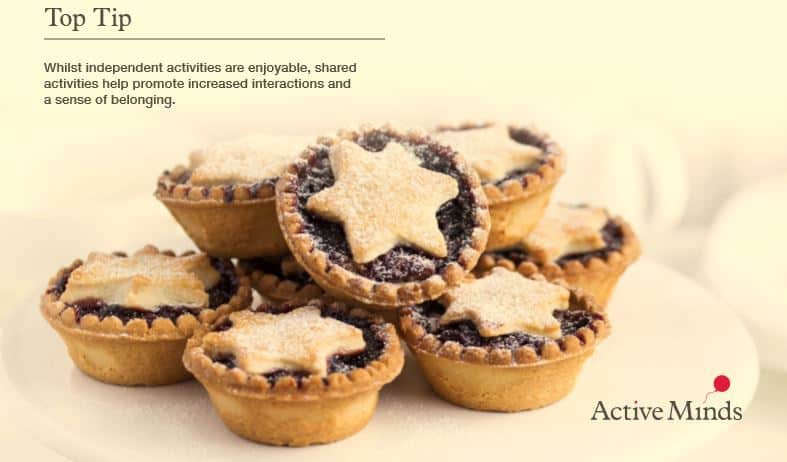Online resource focusses on Festive loneliness
It’s beginning to look a lot like Christmas, a time of year highly anticipated by most. But sadly, for some of those who are affected by dementia, the festive season can become one of the loneliest times of the year. New research from Alzheimer’s society has found that over half of people affected by dementia find Christmas the most isolating time of the year.
Active Minds have released a free online resource to provide advice and ideas to help carers and people living with dementia get through the winter months
Symptoms caused by Alzheimer’s include memory loss, confusion and personality change, the comfort of a persons’ routine is one important thing that can be disrupted at this time of year. Seasonal changes in light and temperature as well as loud noises, decorations and feast of food can become confusing and disorientating. The cold weather turns most of us into hermits which is why it is one of the most important times to encourage socialising and group activities to ensure that people with dementia are getting the mental stimulation they need.
There are currently 850,000 people in the UK living with dementia, and that number is expected to rise to over one million by 2025. It requires complex treatment and there is an ongoing debate as to how best to ensure a good standard of living for people with the condition.
Research from the Department of Health and Alzheimer’s UK has argued for an activities-based approach when caring for people with dementia. Activities such as painting have been proven to help people reconnect with their surroundings and lessen their dependency on anti-psychotic drugs. Since 2010 Active Minds have been researching and developing activities to improve the quality of life for people living with dementia.
Founder of Active Minds, Ben Atkinson-Willes is an advocate of activity products as a treatment for those affected. Ben explains:
“I have experienced the difficulties carers face first hand. My grandfather was diagnosed with Alzheimer’s, as he became less mobile, he became a jigsaw enthusiast. As his ability to complete puzzles diminished, he turned to children’s puzzles. This situation is reflected in many care homes, with children’s activities being used or carers having to devise their own. As a designer, I decided that I could use my skills alongside the experience of those in the care sector to develop care home activities capable of delivering age-appropriate dementia care.”
Active Minds’ recent social impact report showed that 100% of professional carers and 80% of family members felt the activities improved the quality of life of people living with dementia and those who care for them.
The free online resource is available on the website HERE


